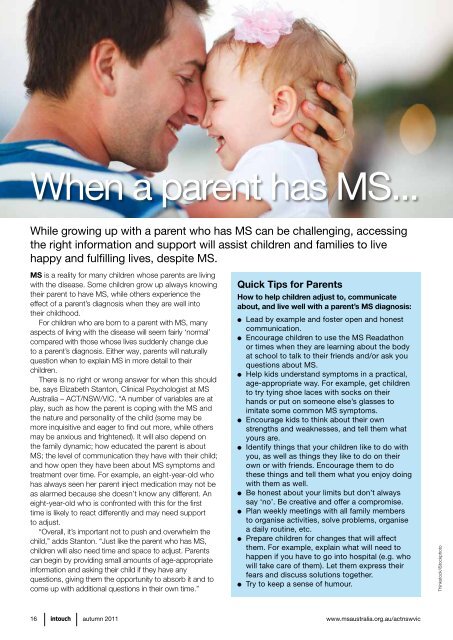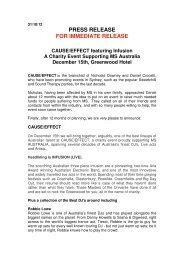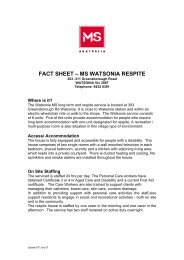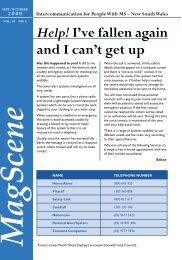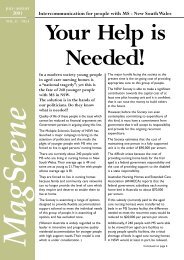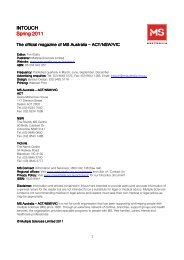Practical advice and personal stories from children ... - MS Australia
Practical advice and personal stories from children ... - MS Australia
Practical advice and personal stories from children ... - MS Australia
You also want an ePaper? Increase the reach of your titles
YUMPU automatically turns print PDFs into web optimized ePapers that Google loves.
When a parent has <strong>MS</strong>...<br />
While growing up with a parent who has <strong>MS</strong> can be challenging, accessing<br />
the right information <strong>and</strong> support will assist <strong>children</strong> <strong>and</strong> families to live<br />
happy <strong>and</strong> fulfilling lives, despite <strong>MS</strong>.<br />
<strong>MS</strong> is a reality for many <strong>children</strong> whose parents are living<br />
with the disease. Some <strong>children</strong> grow up always knowing<br />
their parent to have <strong>MS</strong>, while others experience the<br />
effect of a parent’s diagnosis when they are well into<br />
their childhood.<br />
For <strong>children</strong> who are born to a parent with <strong>MS</strong>, many<br />
aspects of living with the disease will seem fairly ‘normal’<br />
compared with those whose lives suddenly change due<br />
to a parent’s diagnosis. Either way, parents will naturally<br />
question when to explain <strong>MS</strong> in more detail to their<br />
<strong>children</strong>.<br />
There is no right or wrong answer for when this should<br />
be, says Elizabeth Stanton, Clinical Psychologist at <strong>MS</strong><br />
<strong>Australia</strong> – ACT/NSW/VIC. “A number of variables are at<br />
play, such as how the parent is coping with the <strong>MS</strong> <strong>and</strong><br />
the nature <strong>and</strong> <strong>personal</strong>ity of the child (some may be<br />
more inquisitive <strong>and</strong> eager to find out more, while others<br />
may be anxious <strong>and</strong> frightened). It will also depend on<br />
the family dynamic; how educated the parent is about<br />
<strong>MS</strong>; the level of communication they have with their child;<br />
<strong>and</strong> how open they have been about <strong>MS</strong> symptoms <strong>and</strong><br />
treatment over time. For example, an eight-year-old who<br />
has always seen her parent inject medication may not be<br />
as alarmed because she doesn’t know any different. An<br />
eight-year-old who is confronted with this for the first<br />
time is likely to react differently <strong>and</strong> may need support<br />
to adjust.<br />
“Overall, it’s important not to push <strong>and</strong> overwhelm the<br />
child,” adds Stanton. “Just like the parent who has <strong>MS</strong>,<br />
<strong>children</strong> will also need time <strong>and</strong> space to adjust. Parents<br />
can begin by providing small amounts of age-appropriate<br />
information <strong>and</strong> asking their child if they have any<br />
questions, giving them the opportunity to absorb it <strong>and</strong> to<br />
come up with additional questions in their own time.”<br />
Quick Tips for Parents<br />
How to help <strong>children</strong> adjust to, communicate<br />
about, <strong>and</strong> live well with a parent’s <strong>MS</strong> diagnosis:<br />
l Lead by example <strong>and</strong> foster open <strong>and</strong> honest<br />
communication.<br />
l Encourage <strong>children</strong> to use the <strong>MS</strong> Readathon<br />
or times when they are learning about the body<br />
at school to talk to their friends <strong>and</strong>/or ask you<br />
questions about <strong>MS</strong>.<br />
l Help kids underst<strong>and</strong> symptoms in a practical,<br />
age-appropriate way. For example, get <strong>children</strong><br />
to try tying shoe laces with socks on their<br />
h<strong>and</strong>s or put on someone else’s glasses to<br />
imitate some common <strong>MS</strong> symptoms.<br />
l Encourage kids to think about their own<br />
strengths <strong>and</strong> weaknesses, <strong>and</strong> tell them what<br />
yours are.<br />
l Identify things that your <strong>children</strong> like to do with<br />
you, as well as things they like to do on their<br />
own or with friends. Encourage them to do<br />
these things <strong>and</strong> tell them what you enjoy doing<br />
with them as well.<br />
l Be honest about your limits but don’t always<br />
say ‘no’. Be creative <strong>and</strong> offer a compromise.<br />
l Plan weekly meetings with all family members<br />
to organise activities, solve problems, organise<br />
a daily routine, etc.<br />
l Prepare <strong>children</strong> for changes that will affect<br />
them. For example, explain what will need to<br />
happen if you have to go into hospital (e.g. who<br />
will take care of them). Let them express their<br />
fears <strong>and</strong> discuss solutions together.<br />
l Try to keep a sense of humour.<br />
Thinkstock/iStockphoto<br />
16 intouch autumn 2011<br />
www.msaustralia.org.au/actnswvic


